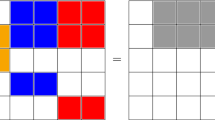Abstract
If the excesses of the coalitions in a transferable utility game are weighted, then we show that the arising weighted modifications of the well-known (pre)nucleolus and (pre)kernel satisfy the equal treatment property if and only if the weight system is symmetric in the sense that the weight of a subcoalition of a grand coalition may only depend on the grand coalition and the size of the subcoalition. Hence, the symmetrically weighted versions of the (pre)nucleolus and the (pre)kernel are symmetric, i.e., invariant under symmetries of a game. They may, however, violate anonymity, i.e., they may depend on the names of the players. E.g., a symmetrically weighted nucleolus may assign the classical nucleolus to one game and the per capita nucleolus to another game.
We generalize Sobolev’s axiomatization of the prenucleolus and its modification for the nucleolus as well as Peleg’s axiomatization of the prekernel to the symmetrically weighted versions. Only the reduced games have to be replaced by suitably modified reduced games whose definitions may depend on the weight system. Moreover, it is shown that a solution may only satisfy the mentioned sets of modified axioms if the weight system is symmetric.
Similar content being viewed by others
Notes
An axiomatization is a characterization by axioms that are logically independent of each other. The logical independence, in particular of the anonymity axiom, was proved by Sudhölter (1993).
References
Albers, W. (1977). Core- and kernel-variants based on imputations and demand profiles. In O. Moeschlin & D. Pallaschke (Eds.), Game theory and related topics (pp. 3–16). Amsterdam: North-Holland.
Aumann, R. J., & Maschler, M. (1985). Game theoretic analysis of a bankruptcy problem from the Talmud. Journal of Economic Theory, 36, 195–213.
Davis, M., & Maschler, M. (1965). The kernel of a cooperative game. Naval Research Logistics Quarterly, 12, 223–259.
Derks, J. J. M., & Haller, H. (1999). Weighted nucleoli. International Journal of Game Theory, 28, 173–187.
Grotte, J. H. (1970). Computation of and Observations on the Nucleolus, the Normalized Nucleolus and the Central Games. Master’s thesis, Cornell University, Ithaka, New York.
Justman, M. (1977). Iterative processes with ‘nucleolar’ restrictions. International Journal of Game Theory, 6, 189–212.
Kleppe, J. (2010). Modelling interactive behaviour, and solution concepts. Ph.D. thesis, Tilburg University, The Netherlands.
Kohlberg, E. (1971). On the nucleolus of a characteristic function game. SIAM Journal on Applied Mathematics, 20, 62–66.
Maschler, M., Peleg, B., & Shapley, L. S. (1972). The kernel and bargaining set for convex games. International Journal of Game Theory, 1, 73–93.
Orshan, G. (1993). The prenucleolus and the reduced game property: equal treatment replaces anonymity. International Journal of Game Theory, 22, 241–248.
Orshan, G., & Sudhölter, P. (2003). Reconfirming the prenucleolus. Mathematics of Operations Research, 28, 283–293.
Orshan, G., & Sudhölter, P. (2010). The positive core of a cooperative game. International Journal of Game Theory, 39, 113–136.
Peleg, B. (1986). On the reduced game property and its converse. International Journal of Game Theory, 15, 187–200.
Peleg, B., & Sudhölter, P. (2007). Introduction to the theory of cooperative games, theory and decisions library, series C: game theory, mathematical programming and operations research (2nd ed.). Berlin: Springer.
Potters, J. A. M., & Tijs, S. H. (1992). The nucleolus of matrix games and other nucleoli. Mathematics of Operations Research, 17, 164–174.
Schmeidler, D. (1969). The nucleolus of a characteristic function game. SIAM Journal on Applied Mathematics, 17, 1163–1170.
Shapley, L. S. (1953). A value for n-person games. In Annals of mathematics studies: Vol. 28. Contribution to the theory of games II (pp. 307–317). Princeton: Princeton University Press.
Snijders, C. (1995). Axiomatization of the nucleolus. Mathematics of Operations Research, 20, 189–196.
Sobolev, A. I. (1975). The characterization of optimality principles in cooperative games by functional equations. In N. N. Vorobiev (Ed.), Mathematical methods in the social sciences, Vilnius (Vol. 6, pp. 95–151). Academy of Sciences of the Lithuanian SSR (in Russian).
Sudhölter, P. (1993). Independence for characterizing axioms of the pre-nucleolus. Working paper 220, Institute of Mathematical Economics, University of Bielefeld.
Wallmeier, E. (1983). Der f-Nukleolus und ein dynamisches Verhandlungsmodell als Lösungskonzepte für kooperative n-Personenspiele. Ph.D. thesis, Westfälische Wilhelms-Universität, Münster.
Young, H. P., Okada, N., & Hashimoto, T. (1982). Cost allocation in water resources development. Water Resources Research, 18, 463–475.
Author information
Authors and Affiliations
Corresponding author
Additional information
The three authors thank Javier Arin for valuable discussions. The third author was supported by the Spanish Ministerio de Ciencia e Innovación under project ECO2012-33618, co-funded by the ERDF, and by The Danish Council for Independent Research|Social Sciences under the FINQ project.




